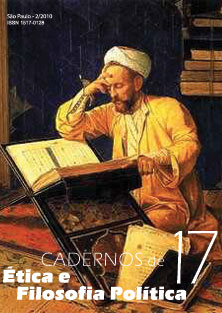Aspects of Ethics in Islam
Keywords:
Islam – religious morality – theological ethics – philosophical ethics.Abstract
The plurality of discussions and the diversity with which the main ethical questions
were approached permit the separation of relative theories elaborated in Islam into
three distinct dimentions: religious morality, theological ethics and philosophical ethics.
Religious morality was elaborated based exclusively on the precepts of the Koran, and
on the teachings of the Tradition (Hadīth). This morality establishes the fundamentals
to determine: a) the nature of what is correct, and of what is iniquous; b) that which is
within the law and divine power’s reach; c) the liberty, and the moral responsibility of
each one. Among the thinkers who elaborated a theological ethic founded on the koranic
precepts, and on the Tradition (Hadīth), making use of theological concepts, philosophical
categories and, at times, inspirations coming from Sufism, Al-Ghazālī stands out
as the most respected theologian of sunni Islam. Among the philosophers, Al-Fārābī,
Avicenna, Avempace and Averroes made ample use of Nicomachean Ethics. As they sought
to conciliate the teachings of the Koran, and of the Tradition (Hadīth) with philosophy,
these philosophers found in the Aristotelian ethics the appropriate indications to realize
the ideal model for human society. Miskawayh also stands out who, although did
not elaborate any ethical system based on philosophical norms, proficuously utilized the
Aristotelian and Platonic doctrines, and the works of Arab philosophers before him such
as Al-Kindī, Al-Rāzī and Al-Fārābī.


